
Kevin Kalinsky, MD, MS, FASCO, discusses safety and quality of life data from ASCENT-04 in PD-L1–positive metastatic TNBC.

Your AI-Trained Oncology Knowledge Connection!


Kevin Kalinsky, MD, MS, is a professor and director of the Division of Medical Oncology in the Department of Hematology and Medical Oncology at Emory University School of Medicine; and the Louisa and Rand Glenn Family Chair in Breast Cancer Research and director of the Glenn Family Breast Center at Winship Cancer Institute of Emory University in Atlanta, Georgia.

Kevin Kalinsky, MD, MS, FASCO, discusses safety and quality of life data from ASCENT-04 in PD-L1–positive metastatic TNBC.

Kevin Kalinsky, MD, MS, FASCO, discusses clinical data potentially supporting the use of TROP2-directed ADCs in frontline metastatic TNBC.

Dr Kalinsky discusses the treatment paradigm for HR-positive breast cancer post-CDK4/6 inhibition and the need for therapeutic advances in this setting.

Kevin Kalinsky, MD, MS, FASCO, discusses research needs to improve treatment strategies in the post-CDK4/6 inhibitor setting for HR-positive breast cancer.
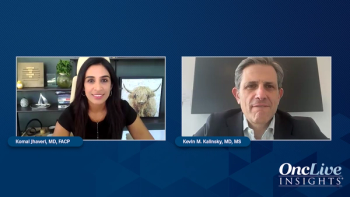
Panelists discuss how the rapidly evolving breast cancer treatment landscape includes promising developments in oral selective estrogen receptor degraders (SERDs), CDK4/6 inhibitor sequencing strategies, and antibody-drug conjugates (ADCs), with new targeted therapies and bispecifics continuing to emerge.

Panelists discuss how treatment decisions between antibody-drug conjugates (ADCs) and continued endocrine-based therapies in HER2-low disease depend on endocrine sensitivity, with ADCs reserved for endocrine-refractory tumors or primary endocrine-resistant cases with short initial response durations.

Panelists discuss how the ASCENT-04 trial findings establish sacituzumab govitecan (SG)plus pembrolizumab as an active standard-of-care combination for triple-negative breast cancer, with considerations needed for patients with prior immunotherapy exposure.

Panelists discuss how DESTINY-Breast09 data support trastuzumab deruxtecan (T-DXd) plus pertuzumab in frontline HER2-positive disease for select patients with extensive disease or brain metastases while emphasizing individualized treatment decisions to avoid overtreatment.

Panelists discuss how prior adjuvant CDK4/6 inhibitor exposure complicates metastatic treatment decisions, with limited data supporting rechallenge strategies and the need for more targeted therapies such as CDK2- or CDK4-specific inhibitors.

Panelists discuss how the PATINA trial findings demonstrate significant progression-free survival benefit from adding palbociclib to endocrine and HER2-targeted therapy in patients with estrogen receptor (ER)–positive, HER2-positive disease following induction chemotherapy, though access challenges remain in clinical practice.

Panelists discuss how the well-tolerated safety profiles of oral selective estrogen receptor degraders (SERDs) and proteolysis-targeting chimeras (PROTACs), despite some low-grade toxicities such as bradycardia and photopsia, make them attractive options, with treatment decisions potentially influenced by specific adverse effect considerations and monitoring requirements.

Panelists discuss how treatment approaches for patients with both ESR1 mutations and PI3K pathway alterations currently rely on single-agent elacestrant for slow-growing disease or doublet therapies for more aggressive cases, with the field rapidly evolving toward targeted combination therapies.

Panelists discuss how proteolysis-targeting chimera (PROTAC) agents such as vepdegestrant offer a different mechanism of action compared with oral selective estrogen receptor degrader (SERDs), with promising clinical activity in ESR1-mutant tumors and the need for more data on optimal sequencing strategies.

Panelists discuss how longitudinal surveillance testing could enable treatment interventions based on molecular progression (ESR1 mutations) rather than waiting for radiographic progression, though questions remain about overall survival impact.

Panelists discuss how oral selective estrogen receptor degraders (SERDs) such as elacestrant are changing treatment for patients experiencing progression on CDK4/6 inhibitors, with current approval for ESR1-mutant tumors and anticipation of additional approvals for other oral SERDs in development.
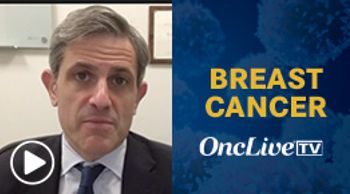
Kevin Kalinsky, MD, MS, FASCO, discusses potential new roles for the CLEOPATRA and DESTINY-Breast09 regimens in the HER2-positive breast cancer paradigm.
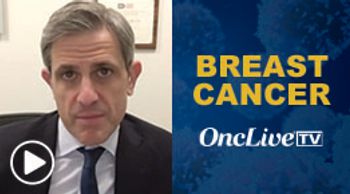
Kevin Kalinsky, MD, discusses the importance of biomarker testing in guiding therapeutic decision-making in HR-positive, HER2-negative breast cancer.
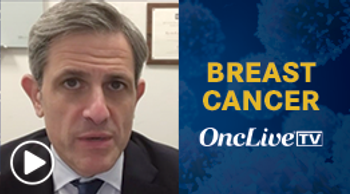
Kevin Kalinsky, MD, MS, FASCO, discusses data with camizestrant plus a CDK4/6 inhibitor in ER–positive, HER2-negative advanced breast cancer.
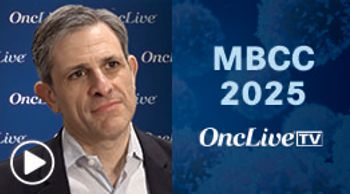
Kevin Kalinsky, MD, MS, discusses the potential to switch CDK4/6 inhibitors in HR-positive metastatic breast cancer.
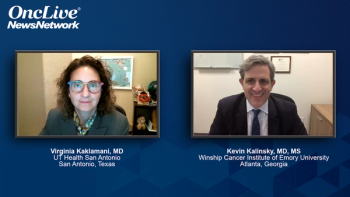
Panelists discuss key updates from the past year regarding HR+/HER2– early breast cancer (eBC), emerging research that could transform treatment approaches, and the role of new biomarkers in patient identification, stratification, and predicting CDK4/6 inhibitor responses; they also highlight studies on the horizon that may further refine treatment strategies and offer closing clinical pearls for diagnosing and managing early-stage breast cancer.

Panelists discuss their approach to sequencing surgery, radiation, and systemic therapies for early-stage breast cancer patients, emphasizing the guiding principles of treatment sequencing and how individual patient factors influence decisions; they also highlight the importance of multidisciplinary coordination, identifying key specialists, ensuring alignment on diagnosis, risk assessment, and treatment goals, and the critical role of including the patient in these discussions.

Panelists discuss how common adverse events (AEs) with CDK4/6 inhibitors in HR+/HER2- early breast cancer (eBC) vary based on treatment and patient population, with strategies for mitigating toxicities, adjusting dosing, and monitoring labs to ensure treatment continuation; they also address approaches to dose reductions, promoting treatment adherence, educating patients about toxicity management, and balancing efficacy, quality of life, and side effect risks, particularly for high-risk patients with no or low nodal involvement.

Panelists discuss how differences in trial designs, including inclusion criteria, dosing, and end points, influence clinical decision-making in the use of CDK4/6 inhibitors for HR+/HER2– early breast cancer (eBC), with a focus on the NATALEE trial’s analysis of patients with no or low nodal involvement, and how recent expanded approval of ribociclib for high-risk node-positive and node-negative eBC patients guides the identification of ideal candidates based on clinical factors.

Panelists discuss how the NCCN guidelines for risk stratification in HR+/HER2– early-stage breast cancer (eBC) guide clinical decision-making, exploring real-world adherence to these guidelines, the complexity of risk stratification in various clinical scenarios, and the role of clinical factors, biomarkers, and advanced testing methodologies (including RSClin N+, next-generation sequencing [NGS], fluorescence in situ hybridization [FISH], immunohistochemistry [IHC], and circulating DNA [ctDNA]) in defining “high-risk” patients and guiding treatment strategies.

Panelists discuss how the NCCN guidelines for risk stratification in HR+/HER2– early-stage breast cancer (eBC) guide clinical decision-making, exploring real-world adherence to these guidelines, the complexity of risk stratification in various clinical scenarios, and the role of clinical factors, biomarkers, and advanced testing methodologies (including RSClin N+, next-generation sequencing [NGS], fluorescence in situ hybridization [FISH], immunohistochemistry [IHC], and circulating DNA [ctDNA]) in defining “high-risk” patients and guiding treatment strategies.

Panelists discuss how the NCCN guidelines for risk stratification in HR+/HER2– early-stage breast cancer (eBC) guide clinical decision-making, exploring real-world adherence to these guidelines, the complexity of risk stratification in various clinical scenarios, and the role of clinical factors, biomarkers, and advanced testing methodologies (including RSClin N+, next-generation sequencing [NGS], fluorescence in situ hybridization [FISH], immunohistochemistry [IHC], and circulating DNA [ctDNA]) in defining “high-risk” patients and guiding treatment strategies.

Panelists discuss how HR+/HER2– early-stage breast cancer (eBC) is characterized by hormone receptor–positive, HER2-negative tumors, focusing on unmet patient needs, the goals of treatment in this setting, and the critical timing for discussing recurrence risk with patients.
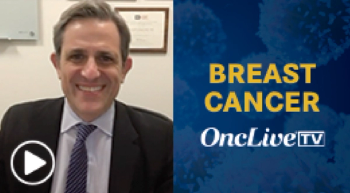
Kevin Kalinsky, MD, MS, discusses the phase 3 DESTINY-Breast06 trial evaluating trastuzumab deruxtecan in HER2-expressing breast cancer.
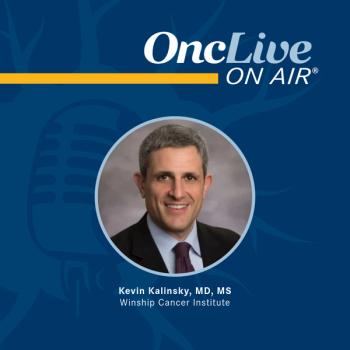
Kevin Kalinsky, MD, MS, discusses his top takeaways from the 2024 ASCO Annual Meeting and 2024 ESMO Congress, as well as where he sees the field of breast cancer evolving into the future.
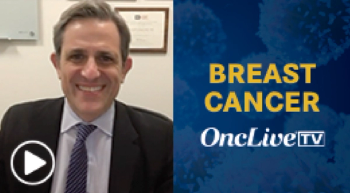
Kevin Kalinsky, MD, MS, discusses future treatment directions with T-DXd in breast cancer, as well as the evolving role of HER2 classification.
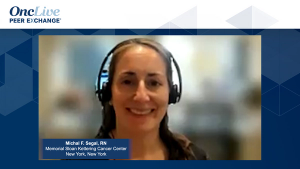
Published: November 3rd 2023 | Updated:
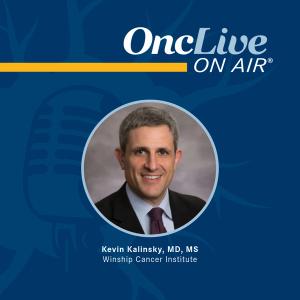
Published: November 7th 2024 | Updated:

Published: January 16th 2024 | Updated:

Published: January 30th 2024 | Updated:

Published: January 31st 2022 | Updated:
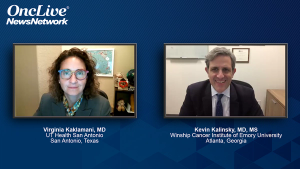
Published: December 18th 2024 | Updated: